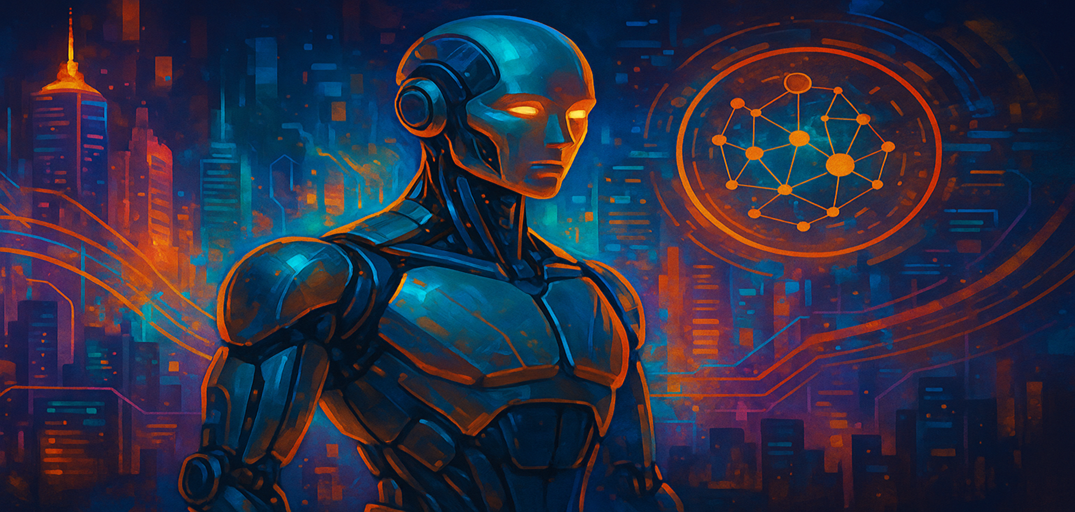For the past year, generative AI has dominated headlines – writing emails, summarising documents, and assisting employees with daily tasks. But business leaders now realise that content generation is only the beginning. The real transformation happens when AI stops merely responding and starts acting autonomously.
This next evolution is powered by Agentic AI – intelligent systems capable of reasoning, making decisions, and performing work across business applications with minimal human intervention. Microsoft, OpenAI, and Gartner have all highlighted this as a major shift in enterprise technology[¹][⁸][⁹].
For companies running Microsoft Dynamics 365 applications, this shift is not futuristic, it’s happening now.
What is Agentic AI?

Generative AI produces outputs – answers, summaries, recommendations. Agentic AI goes a step further: it can think, decide, and execute tasks across systems[¹].
If generative AI is like a smart assistant that answers your questions, agentic AI is like an employee who understands your goals and gets the work done for you.
It can:
- interpret what you want,
- break the objective into smaller steps,
- take actions across ERP, CRM, email, or workflows,
- monitor progress,
- and notify you only when something needs approval.
In simple terms:
A normal AI tells you your stock is low. Agentic AI finds suppliers, compares prices, drafts a purchase order, and submits it for your approval.
It doesn’t just provide answers – it completes jobs.
This is where ERP and CRM systems become intelligent, proactive, and self-orchestrating.
Why Agentic AI Matters for Modern Businesses
Agentic AI is not just another technology trend – it represents a fundamental shift in how organisations operate, make decisions, and scale. Several forces make its emergence both critical and inevitable.
Workloads Are Increasing Faster Than Headcount Can Grow
Operational complexity is rising – more customers, more channels, more transactions, more compliance, but hiring is not able to scale proportionally. Agentic AI bridges this gap by automating knowledge work that once required human attention.
Most Business Processes Still Rely on Manual, Fragmented Workflows
Even digitally enabled organisations depend heavily on emails, spreadsheets, handovers, approvals, and reminders. Agentic AI removes this friction by coordinating tasks end-to-end across applications, without waiting for human intervention[¹].
Data Volumes Have Outgrown Human Processing Capacity
Modern organisations generate more operational data than teams can analyze. Agentic AI continuously monitors information, detects patterns, flags anomalies, and triggers corrective actions automatically[¹][⁸].
Customers Expect Instant Responses and Always-On Operations
Whether in service, sales, logistics, or finance, customers expect answers in minutes, not days. Agentic AI delivers the speed and consistency that human teams alone cannot match[²].
Competitive Advantage Requires Real-Time Decision-Making
Success is increasingly dependant on how fast an organisation can interpret data and act. Agentic AI augments teams with machine-speed decision-making.
Traditional Automation Has Reached Its Limit
Workflow Automation and Robotic Process Automation (RPA) work best for repetitive, rigid, rule-based tasks. Agentic AI brings reasoning, context-awareness, and flexibility, enabling automation for work that has historically been too fluid or unstructured[¹][⁹].
Organisations Need Systems That Act Proactively
Instead of reacting to late shipments, overdue invoices, stock-outs, or customer complaints, agentic AI predicts problems and takes preventive action, shifting operations from reactive to proactive.
Businesses Must Stay Resilient Amid Uncertainty
Economic fluctuations, supply chain volatility and talent shortages require businesses to stay flexible. Agentic AI helps by increasing digital capacity without increasing headcount.
How Agentic AI Transforms Business Applications
Microsoft has infused agentic capabilities across Dynamics 365, Business Central, Power Platform and Microsoft 365[²][³][⁴].
Agentic AI enhances systems in three major ways:
1. Autonomous Action
Agents perform work — not just suggest it. Examples:
- Create and update ERP records
- Schedule technicians’ availability
- Approve procurements within thresholds
- Clean and classify master data
- Trigger workflows and tasks
2. Continuous Orchestration
Agents coordinate activities across systems:
- Fetch data from Business Central
- Trigger actions in CRM
- Update files in SharePoint
- Send updates via email or Teams
All done autonomously, using Microsoft’s AI and automation stack[³][⁴].
3. Intelligent Decision-Making
Agents make decisions based on real-time business data, encompassing:
- Inventory levels
- Customer history
- Asset telemetry
- Project budget burn
- Supplier lead times
- and more…
This results in faster, more consistent decisions.
Microsoft’s Agentic AI Ecosystem
Microsoft now offers a complete foundation for enterprise-grade autonomous agents:
✔ Microsoft Copilot
AI embedded directly into every Dynamics 365 and Microsoft 365 application[²].
✔ Copilot Studio
Build custom agents that can access business data, integrate systems, and run automated workflows[³].
✔ Microsoft Agent Framework (Agentic AI)
A platform for multi-step planning, reasoning, and autonomous execution across systems[¹].
✔ Governance & Responsible AI Controls
Built-in oversight:
- Permissions
- Audit logs
- Safe boundaries
- Identity safeguards
- Aligned to Microsoft’s Responsible AI Standard[⁶].
✔ Native Integration with Dynamics 365 & Business Central
Agents can perform operational tasks with full ERP/CRM context[²][⁵].
Real-World Opportunities Across Business Functions
Agentic AI is not limited to a single department or workflow. Its ability to analyse context, take initiative, and execute tasks autonomously makes it valuable across the entire business. From finance to field operations, agentic AI enhances efficiency by handling routine work, reducing delays, and enabling teams to focus on higher-value activities.
1. Finance & Accounting
Agents can:
- Reconcile transactions
- Match invoices against POs
- Detect financial anomalies
- Generate management reports
- Send automated payment reminders
Impact: Faster closing, fewer errors, reduced workload.
2. Sales & Customer Engagement
Agents can:
- Prioritise leads
- Generate quotes using ERP pricing
- Suggest next-best actions
- Follow up automatically
- Keep CRM data updated
Impact: Higher conversion and better pipeline accuracy.
3. Customer Service & Contact Center
Agents can:
- Triage cases
- Suggest resolutions
- Respond autonomously to simple enquiries
- Escalate based on sentiment
- Generate knowledge content
Impact: Faster response times and improved customer satisfaction.
4. Field Service & Asset Management
Agents can:
- Detect equipment anomalies
- Auto-create work orders
- Recommend spare parts
- Schedule technicians
- Keep customers informed
Impact: Higher first-time fix rate, reduced downtime.
5. Supply Chain, Projects & Operations
Agents can:
- Predict stock-outs
- Recommend suppliers
- Detect shipment delays
- Manage replenishment
- Identify project overruns
Impact: Smoother operations and better agility.
Conclusion: The Future of Business Applications Is Autonomous
Agentic AI marks a major evolution in enterprise software. Business applications are no longer passive systems of record – they are becoming intelligent collaborators capable of automating work, orchestrating processes, and optimising outcomes with minimal supervision.
As agentic capabilities mature across modern ERP, CRM, and productivity platforms, organisations can transform operations without restructuring teams or building heavy custom workflows. The next generation of business systems will not simply store information – they will anticipate needs, take action, and continuously improve performance.
Organisations that embrace agentic AI early will gain faster decision velocity, greater operational resilience, and the freedom to focus human talent on strategic, high-value work. The future of business applications is autonomous, intelligent, and self-driven – and the shift has already begun.
References:
[1] What is Azure AI Foundry Agent Service?
https://learn.microsoft.com/en-us/azure/ai-foundry/agents/overview
[2] Copilot and Generative AI in Dynamics 365
https://learn.microsoft.com/en-us/dynamics365/copilot/
[3] Microsoft Copilot Studio Documentation
https://learn.microsoft.com/en-us/microsoft-copilot-studio/overview
[4] Microsoft Power Platform – AI & Automation Overview
https://learn.microsoft.com/en-us/power-platform/
[5] Dynamics 365 Business Central Documentation
https://learn.microsoft.com/en-us/dynamics365/business-central/
[6] Overview of Responsible Use of AI – Azure AI Services
https://learn.microsoft.com/en-us/azure/ai-services/responsible-use-of-ai-overview
[7] Dynamics 365 – Business Applications Documentation
https://learn.microsoft.com/en-us/dynamics365/
[8] Gartner – Top 10 Strategic Technology Trends for 2024
https://www.gartner.com/en/articles/gartner-top-10-strategic-technology-trends-for-2024
[9] OpenAI – Assistants & Agentic AI Concepts
https://platform.openai.com/docs/guides/assistants





